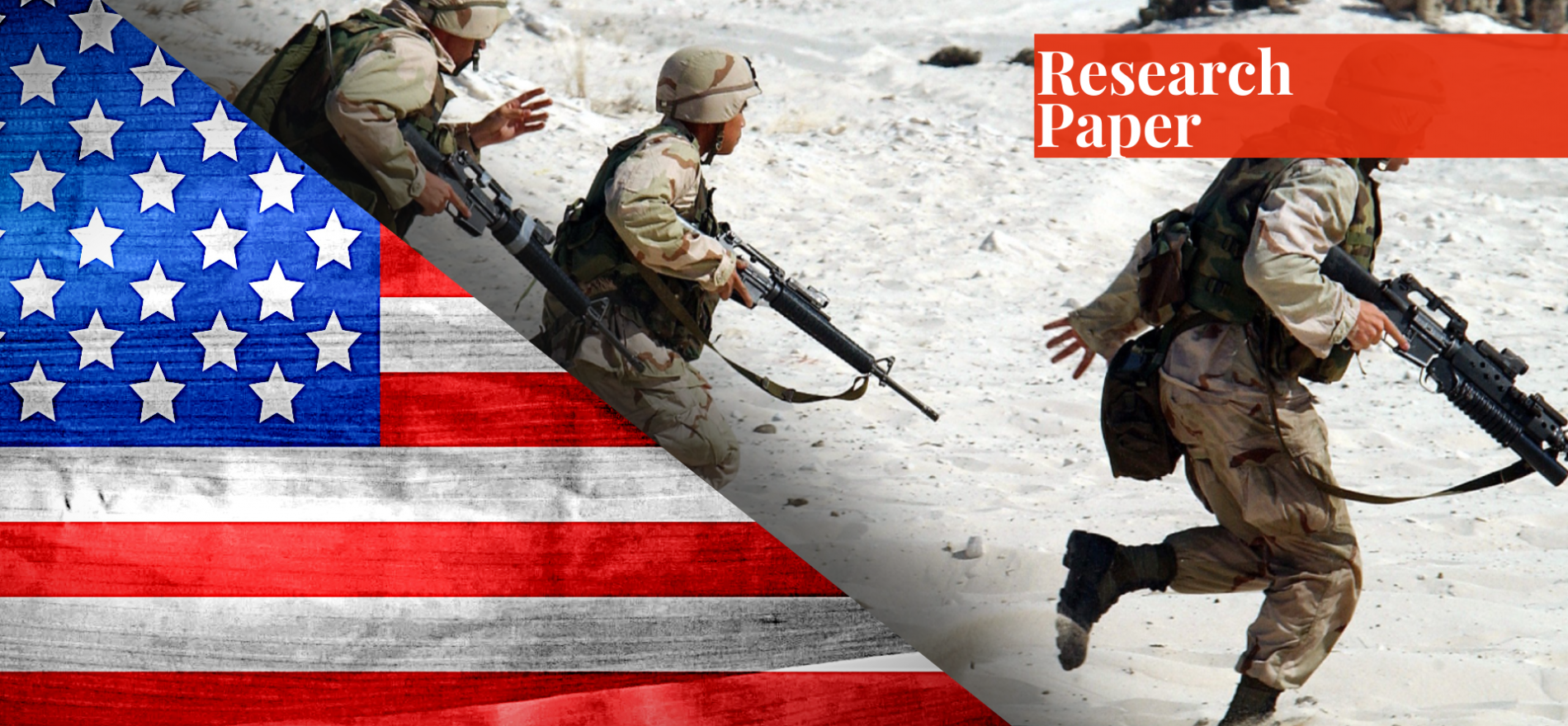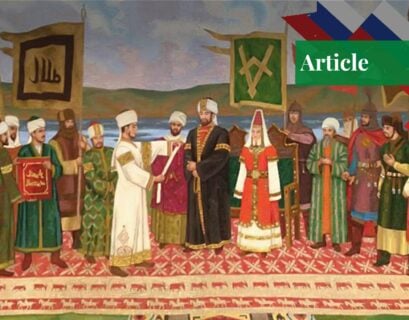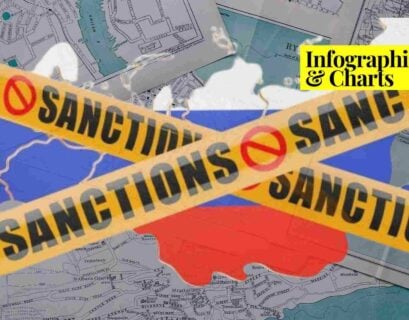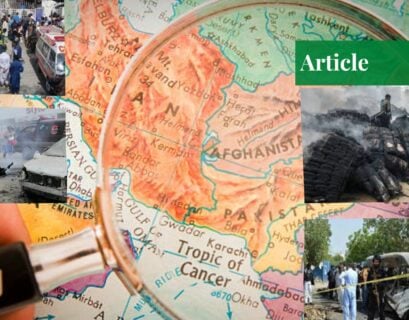Saba Imran is currently working as the Director Programs for a policy and legal research think-tank based in Islamabad. She is a graduate of Brunel University in London where she completed her undergraduate degree in law with honours before pursuing further study in political science with a Master’s degree in international relations. She has worked with numerous international organizations to develop quality research on issues in need of legal and policy reform.
Introduction
The purpose of this essay is to understand why the United States failed to launch a successful foreign policy based on humanitarian intervention following the end of the Cold War. This essay will address this topic in light of various factors i.e. U.S. failure to acquire international legitimacy for the doctrine of humanitarian intervention; the lack of a coherent vision for the policy framework; the danger of this doctrine to sovereign rights; and detailed case studies of U.S. humanitarian interventions in Kosovo, Iraq, and Afghanistan. These factors serve to illustrate the mistakes made by the U.S. government in carrying out humanitarian-based interventions.
The defeat of the Soviet state prompted a paradigm shift in the global power structure, with the United States standing as the remaining world superpower. In spite of military and economic strength, there was no singular purpose to inspire a political framework that would give the U.S. reason to exercise its power. The Cold War had given the American state a collective national interest behind which it could unite – protecting the world from the Soviet threat – but in the aftermath, the U.S. was left with a policy vacuum. The doctrine of humanitarian intervention was adopted to fill this political void, and to provide the U.S. with an ideological premise for exercising its role as a great power.1
Initially, the new doctrine of humanitarian intervention was accepted and viewed by the international community as a promising policy agenda. The U.S. led the way for change in international policy activism and international law by expanding and consolidating the rights of the key power states to exercise their authority. The concepts of international peace, security, and human rights were now significant enough to undermine the national sovereignty of weaker states. In 1991, at the end of the Gulf war, the United Nations Security Council Resolution 688 held that Iraqi domestic policy towards its people threatened international peace and security and hence it was an area that warranted humanitarian intervention.2
A New Policy
The U.S. gradually abandoned its former Cold War principles of non-intervention and the primacy of sovereignty in favor of its new policy vision for humanitarian intervention. In spite of repeated attempts, the U.S. was unable to create a successful national interest based on humanitarian intervention. This was primarily due to two reasons, namely the inability of the U.S. to procure long-standing credibility for its new political framework for humanitarian intervention and the absence of a coherent vision.3 With reference to the first point, the U.S. was unsuccessful in acquiring legitimacy for its new foreign policy vision because most other states refused to support a policy that endangered their own sovereignty.
Non-western states, in particular, were displeased with the assumption that factors such as human rights could take precedence over their own sovereign rights. Moreover, western allies of the U.S. feared that the policy of humanitarian intervention might facilitate U.S. unilateralism and the consequences that legitimizing such a policy would have on their own international standing.4 The outline for the humanitarian intervention agenda questioned the right of the United Nations as the sole authorizing body for military interventions by allowing states jurisdiction in matters which previously could only be dealt with by the United Nations Security Council (UNSC).
The position of the U.S. as a world superpower with significant military and fiscal backing allowed it to influence decisions on humanitarian interventions. The added support of other states, in certain cases, further allowed the U.S. to challenge the authority of the United Nations. The other states which, along with the U.S., formed the international institutions that determined such global issues, were unwilling to see the U.S. marginalize the authority of organizations such as the UN, which allowed them to play a major role in world affairs.5 The second factor contributing to U.S. failure in implementing a long-term political framework built on humanitarian intervention, is the lack of a coherent political vision.
The U.S. government tried to mold what was essentially an instrument justifying the exercise of U.S. power, into an ideological purpose around which it could shape U.S. foreign policy. To this effect, the policy of humanitarian intervention has been described as “a doctrine of crisis management” that is based on “responding to an emergency”.6 Protecting the rights of citizens suffering under despotic regimes and putting an end to human rights violations in conflict-prone countries is not part of a wider political strategy but, simply, an immediate and temporary solution to a humanitarian crisis and “it is impossible to develop a coherent political strategy based purely on prevention”.7
The U.S. carried out international interventions hoping that the communication of power through the international economic and military presence and humanitarian aid would reflect a strong but benevolent state. Instead, the appearance was one of weakness and failure as critics questioned the U.S. inaction in Rwanda and Congo and criticized the lack of decisive action in Bosnia. To a lesser extent, Kosovo, which is presumably a success for humanitarian intervention, was also picked apart as critics expressed dissatisfaction over the number of civilians killed and the military strategy of air bombings when land troops could have reduced the death scale. The result was that even U.S. citizens began to question the aim of an incoherent policy that sent their troops to die for a cause that did not achieve anything in the long term.8
State Sovereignty
The debate over sovereignty in recent years has been a particularly interesting and controversial issue. For a long time, the U.S. considered that once granted, state sovereignty was a right of absolute autonomy that gave a state the prerogative to act without interference within its borders. However, with the changing world order where people are more aware of global conflicts, states including the U.S. have begun to consider sovereignty a responsibility, as opposed to a right. This principle does not give states the right to actively abuse the basic human rights of individuals regardless of their citizenship status. Instead, along with the right of national sovereignty, a state also has the responsibility to protect its people and ensure that their rights are upheld.9
The United Nations Charter takes account of not only state sovereignty but also the sovereignty of each and every individual. It states that all people are entitled to human rights and dignity. According to the Charter, if the harmful actions of a state towards its people threaten international peace and security, then that state loses the privilege of sovereignty.10 The incidences of genocide and mass killings in Rwanda and the former Yugoslavia in the 1990s have further encouraged limiting sovereignty to justify intervention by other states. As a result, in 2001, the International Commission on Intervention and State Sovereignty (ICISS) drafted a report that highlighted the doctrine of Responsibility to Protect (R2P).11
The Responsibility to Protect (R2P) Doctrine
The R2P doctrine was developed to offer foreign protection to individuals suffering from gross human rights violations through mass killings and ethnic cleansing. The document holds that the fundamental responsibility of a nation-state is to protect the lives of its people; if the state is unable to do so or it is itself liable for actions that harm its citizens, then other states are obligated to intervene, by force, if necessary, to protect the lives of the people suffering.12 The problem with the doctrine of humanitarian intervention that the R2P document advanced was that it was subverting the previous international order founded on equal sovereignty, and constructing an unreliable model that could worsen the conflict and further aggravate the dynamics of international relations.
Furthermore, it has also been argued that interventions spurred by self-interest and other motives such as imperialism and hegemonic rule could be carried out behind humanitarian causes.13 Arguably, such was the case for Kosovo under the administration of President Bill Clinton. Although Kosovo is often hailed as a successful mission for humanitarian intervention, Walden Bello has argued that the intervention in Kosovo was not primarily driven by humanitarian concern but rather by a case of “great-power logic”. He further states that while many people were motivated by the atrocities suffered by the ethnic Albanians at the hands of Serbian forces, for Washington, it was mainly a matter of furthering its “geopolitical designs”.14
Self-interest in the Guise of Humanitarian Intervention
The premise for this argument is that the intervention in Kosovo was an operation for NATO expansion. Andrew Bacevich suggested that the actions of Slobodan Milosevic in Kosovo and, before that, in Bosnia questioned the competency of NATO and, by association, that of the U.S. leadership in Europe. Therefore, the displacement of Milosevic was not only essential for putting a stop to his tyrannical rule but also for the successful continuation of NATO expansion. This would have been a particular achievement for the U.S. under the Clinton administration as it would “fill the security vacuum in Eastern Europe and institutionalize U.S. leadership in post-Soviet Europe”.15
The NATO intervention in Kosovo is also indicative of the U.S.’s attempts to democratize Eastern Europe in its own image as part of the “enlargement strategy” of the Clinton administration. This is supported by the claim of a NATO official who stated that the aim of NATO expansion in Eastern Europe was to “enmesh them in the NATO culture, both politically and militarily, so they begin to think like us-and over time-act like us”.16 NATO involvement in Kosovo also gave the U.S. the opportunity to emphasize inaction by the European government in face of the humanitarian crisis and point out that success in overthrowing Milosevic would not have been possible without U.S. aid.17
A more significant outcome of the Kosovo crisis is the loss of credibility for the UNSC. The U.S. evaded the requirement for a mandate by the United Nations authorizing intervention and used NATO to proceed with the operation, which was carried out by a majority of U.S. forces. This created a dangerous precedent of sidelining UN authority and abusing the principle of state sovereignty on humanitarian grounds that would be repeated later in Iraq and Afghanistan.18 It is interesting to note that despite experiencing the greatest number of genocides and mass killings, humanitarian intervention in Africa seems to be of little interest to the U.S.
Turning a Blind Eye to Africa
This is not to say that the U.S. never intervened during a humanitarian crisis in Africa — it did so in Somalia. However, it has been argued that the U.S. intervened on account of the geopolitical and economic benefits of Somalia, particularly its location opposite the Arabian Peninsula. Nevertheless, the U.S. withdrew early following the incident of Mogadishu, leaving the country still inundated with conflict and violence. Similarly, in Sudan where the death toll was astounding, the U.S. government, under Bush, provided sufficient political and diplomatic pressure to ensure a tenuous peace in Southern Sudan. Unfortunately, this has only shifted the problem to Western Sudan where the Sudanese government is reenacting its mass killings.19
The most documented case of U.S. inaction toward a humanitarian tragedy was that of Rwanda. The Clinton administration not only refused to send military aid to Rwanda, but also prevented the UN from gathering military troops from other states. Kurth suggests that the reason for this was the setback suffered by U.S. troops six months earlier from the Mogadishu incident in Somalia.20 The position of the U.S. as a great power would be most beneficial to the African countries that are frequently mired in massacres and death. However, the shortage of historical connections and insufficient political and economic interests have made Africa a poor investment for U.S. interventionism.21
The Bush Regime
The Bush administration came into office with very specific ideas for the U.S. policy framework. Bush wanted to focus almost exclusively on U.S. national security interests through a foreign policy approach of militarization and unilateralism. He introduced a three-branch strategy that slowly isolated the U.S. from international institutions and alliances; developed the preemptive and preventive war policy; and pushed for forced democratization in totalitarian regimes to counter-terrorism in the Middle East. It was with this concept of promoting a “freedom agenda”, to secure the safety of the U.S. that the Bush administration carried out military interventions in Afghanistan in 2001 and in Iraq in 2003.22
In the initial stages of the Bush administration, the U.S. foreign policy was targeted at other major international powers such as China and Russia as well as the main regional conflict zones including the Arab-Israeli and the Indo-Pak conflict. Weak states like Afghanistan that had little strategic value were considered low priority issues regardless of the humanitarian needs arising from the ruthless Taliban leadership. However, the 9/11 terrorist attack proved that even failed and fragmented states could pose a national threat to the security of strong nations. It was at this point that the global war on terror became the most important security issue on the international and U.S. foreign policy agenda and hence the doctrine of humanitarian intervention had to take a back seat.23
The Afghanistan Case
In 2001, the U.S. invaded Afghanistan under article 51 of the United Nations Charter which allowed for attacking in self-defense. As such, the U.S. received little disapproval from its western allies who were similarly shocked by the 9/11 terrorist attack. The Bush administration portrayed its invasion of Afghanistan as not only necessary for eliminating the threat to international peace and security posed by al Qaeda but also as a humanitarian intervention essential for freeing the citizens of Afghanistan from the leadership of the ruthless Taliban government.24
However, the U.S. intervention in Afghanistan backfired when questions started arising over the real reason why the U.S. invaded Afghanistan. Critics began to argue that Afghanistan was a repeat of Kosovo in that it, too, was influenced by great-power logic. Criticism became more stringent as missions to locate Osama bin Laden were overshadowed by a growing U.S. military presence in South West Asia that would strategically allow the U.S. “control of both oil-rich the Middle East and energy-rich Central Asia”.25
The U.S. case for humanitarian intervention in Afghanistan resulted in large-scale collateral damage and civilian deaths as the U.S. military forces could not differentiate between the opposing forces and non-combatants. The campaign also resulted in political and humanitarian upheaval, with the citizens of Afghanistan bearing the brunt. As tyrannical as the Taliban rule was, it offered the people order and security that had been lacking for more than three decades. The occupation of Afghanistan by outside forces removed even a semblance of security for the people and left the country in a fragmented state of anarchy.26
Poppy production, which under the Taliban rule had been controlled and reduced significantly, has, since 2001, increased exponentially leaving Afghanistan to be a narco-state. Even those at the top levels of the government including officials and legislators are actively part of heroin dealing in Afghanistan. Ahmed Wali Karzai, the brother of President Karzai, was involved in heroin abuse until his death. Similarly, the level of security since the deposition of the Taliban in 2001 has declined to an astonishing degree. Reports conducted by the Center for Strategic and International Studies show that one-third of the country is held off-limits to the United Nations staff and NGOs.
Furthermore, the Karzai government, which the U.S. helped install, has control over very few cities outside of Kabul, leaving the rest of Afghanistan irreparably fractured.27 The impression left from the war in Afghanistan is that it was poorly managed with an inconclusive policy aim and a weak military strategy that was responsible for the death of several civilians. The U.S. kept changing its justification for intervening in Afghanistan; the reasons ranged from capturing Osama bin Laden to overthrowing the Taliban government and offering humanitarian assistance depending on the international response and public mood. The policy for the war on terrorism is based on emergency response for crisis management and not cohesively framed with a future objective in mind. This, in turn, leaves the U.S. image vulnerable to further criticism for failing to achieve the desired results in Afghanistan.28
Iraq
The US invasion of Iraq in 2003, during the Bush administration, is significant for the ramifications it held for the US’ reputation internationally. The rationale given for the war was simple enough at first, with the U.S. government claiming that Iraq was in possession of weapons of mass destruction that were seen as a threat to the security interests of the U.S. This concern was aggravated by links between al-Qaeda and Iraq, which would certainly have been detrimental to international peace and security. Soon enough, when no weapons of mass destruction were found by U.S. troops in Iraq, the Bush administration immediately backtracked and asserted that the intervention was grounded in humanitarian concern for the citizens of Iraq who were suffering under the oppression of a vicious dictator.
The fact that Saddam Hussein had carried out the bulk of his human rights transgressions against the Kurds and Shites in the late 1980s and early 1990s was seemingly irrelevant to the U.S., who were in Iraq to ostensibly remove the Saddam regime.29 Some critics have argued that the intervention in 2003 was inspired by U.S. economic interests in Iraq, since Iraq is a prime base for strategic control of the “oil-rich Middle East”; by planting its military forces there, the U.S. was in a position to utilize Iraq’s oil resources for its own benefit. Others have still argued that the U.S. interest in Iraq was aimed at the democratization of the state, which would have gained the U.S. a foothold in the Middle East, to expand its framework for liberal democracies and free-market economies.30
The consequences of the 2003 war in Iraq have been quite drastic for the U.S. for a number of reasons. The war created dissent in the international community over the use of force in a preemptive manner that was utilized by the U.S. in reference to weapons of mass destruction. The U.S. made a unilateral decision, which a majority of the international community disapproved of especially because of the weak preemptive and preventive reasoning that the U.S. gave for it. For critics of the U.S. interventionist policy, U.S. action in the face of widespread opposition from the rest of the world and its marginalization of the United Nations have increased concerns of U.S. dominance and hegemonic rule.
Subsequently, critics also hold the U.S. responsible for opening up the risk of abuse of the doctrine of humanitarian intervention by setting a precedent for unilateral interventions based on weak justifications. Moreover, “if all wars can be humanitarian, then the humanitarian exception itself ceases to have meaning”.31 The intervention in Iraq has also been damaging to the political will of the U.S. in regards to any new projects of humanitarian intervention it might pursue.
The Iraq war tarnished the reliability of U.S. motives in pursuing overseas interventions, leaving the U.S. with very little credibility before other states and the United Nations in particular. This is mostly because of the manner in which the U.S. treated the United Nations by providing them with arguments and suspicions that were later proven as spurious and, moreover, disregarding opposition by the UNSC to proceed with the war in Iraq. Furthermore, the events of 2003 have given other states an excuse to oppose humanitarian interventions that may be advocated for in the future by the U.S. This would obviously have been the case anyway with countries like China and the Arab states opposing suggested interventions because of their own national interests but the Iraq war has now given them a legitimate excuse to do so.32
The legacy of the Bush administration has been detrimental to the reputation of the U.S. The two major humanitarian campaigns carried out during Bush’s presidency have both been discredited and criticized for having hidden agendas. The predominant concern was that the government was almost single-minded in its aim of accumulating power for the U.S. The Iraq war was a perfect example as it eloquently demonstrated the willingness of the U.S. to disregard international opinion and undermine the authority of the United Nations for its own national interests. The blowback from the Iraq war has received strong criticism, painting the Bush administration as imperialistic and bent on U.S. hegemony.33
The Need for an Alternative
There has been a lot of debate around the future of the doctrine of humanitarian intervention and the effectiveness of the UNSC as the authorizing body for such actions. The problem with the UN is that, in most cases, the proposed intervention is likely to be vetoed by one of the five members of the Security Council on grounds of state interest. A clear example of this was seen during the Kosovo crisis where the Chinese and Russians prevented the UNSC from taking any action. The opposition was not even based on Serbian claims to sovereignty, but on concerns about how an intervention, in this case, would affect Russian and Chinese interests in Chechnya, Taiwan, and Tibet.34
Furthermore, there is a strong probability of opposition from a large number of states in the General Assembly that will regard the intervention as a risk to their own sovereign rights and oppose it on that principle alone, and even if the intervention is ultimately sanctioned by the UNSC, there is still the problem of assembling and directing a multinational military force, which is a time-consuming process that results in delayed action to help the victim state.35 Consequently, there have been proposals for an alternative legitimate authority for humanitarian interventions.
Many critics have suggested that regional organizations should assemble a modern military force that remains ready for action and is recruited from the concerned region. The example given by Kurth is that of the European Union; he describes how a regional military force could be trained and equipped to deal with ethnic conflict in areas of Europe such as the Balkans. Of course, with the presence of NATO, such a force in Europe would be irrelevant. However, the African Union which consists of 53 members could very well manage such a project. With financial support and training provided by the U.S. and the E.U., the African Union could gather troops from all over Africa and organize them as a regional military force specifically trained to handle conflicts in the African continent.36
Conclusion
Since the early 1990s, the U.S. has been an important player in advocating for the legitimacy of a humanitarian interventionist foreign policy. U.S. involvement in support of this policy is somewhat ironic when taken in context with the U.S. Cold War principle of equal sovereignty, and the U.S.’s determination to protect the Cold War world from the influence of the Soviet state. However, it is an unquestionable fact that when the citizens of a state are being denied their fundamental human rights, then the state is obliged to act in a manner that puts an end to such violations. If the state is unwilling or unable to do so, then it falls on the international community to take action and to prevent needless suffering and death.
More often than not, it is the major powers of the world that have the resources to intervene and help protect the lives of those in need. Therefore, telling the major powers not to offer aid and assistance where it is desperately needed, is certainly not the solution to maintaining a balance between the policy of humanitarian intervention and the principle of sovereignty. Unfortunately for the U.S. government, fear of risking state sovereignty has strongly influenced other states from accepting the U.S. political vision for humanitarian intervention. The fact that this doctrine would also give powerful states like the U.S. a means to marginalize the United Nations has also contributed to the reluctance displayed by most countries in adopting this policy.
The problem lies with the U.S. interpretation of the interventionist doctrine within its policy framework. Humanitarian intervention is being offered as a solution to individual and regional disputes with no long-term results of success. As such, when states fail despite humanitarian intervention from U.S. troops, the blame is automatically laid at the feet of the U.S. government for not utilizing a better military and political strategy. Cases like Iraq and Afghanistan are apt examples of how the lack of a coherent vision resulted in the U.S. gaining an unfavorable reputation for humanitarian interventions from the international community.
Moreover, accusations of the U.S.’s self-interest hidden behind humanitarian concerns, imperialistic and unilateral tendencies of the Bush administration, and inaction in conflict-prone countries, especially in Africa where humanitarian intervention would have been much better served, have left the U.S. with a loss of credibility. Nonetheless, even though U.S.-led humanitarian interventions have a somewhat dismal record, there is still hope for the doctrine of humanitarian intervention, provided that it is directed under the auspices of the UN or regional organizations like the African Union who, with financial backing from the U.S. and E.U., could build a regional military force trained and equipped to manage conflicts in the jurisdiction of the respected organizations.
Endnotes
1 David Chandler, Constructing Global Civil Society: Morality and Power in International Relations (Palgrave Macmillan, 2004), 71.
2 Chandler, Constructing Global Civil Society, 71.
3 Chandler, Constructing Global Civil Society, 71.
4 Chandler, Constructing Global Civil Society, 71.
5 Chandler, Constructing Global Civil Society, 72.
6 David Chandler, “National Interests, National Identity and ‘Ethical Foreign Policy’,” in The Situated Politics of Belonging, eds. Nira Yuval-Davis, Kalpana Kannabiran and Ulrike Vieten (SAGE Publications, 2006), 168.
7 Chandler, ‘National Interests, National Identity,’ 169.
8 Chandler, ‘National Interests, National Identity,’ 169-171.
9 Bruce W. Jentleson, “Humanitarian Intervention and Sovereignty Delegation: Why? When? Who Decides? How Much?” (draft paper for the Conference on Delegating Sovereignty: Constitutional and Political Perspectives, Duke University, 2-4 March 2006), 1, https://web.law.duke.edu/publiclaw/pdf/workshop06sp/jentleson.pdf.
10 Jentleson, ‘Humanitarian Intervention and Sovereignty Delegation,’ 2.
11 Walden Bello, “The Crisis of Humanitarian Intervention,” last modified August 9, 2011, https://fpif.org/the_crisis_of_humanitarian_intervention/.
12 Jentleson, ‘Humanitarian Intervention and Sovereignty Delegation,’ 2.
13 Robert J. Delahunty and John Yoo, “The ‘Bush Doctrine’: Can Preventive War be Justified?” Harvard Journal of Law and Public Policy 32, no. 3 (2009): 6, https://papers.ssrn.com/sol3/papers.cfm?abstract_id=1396754
14 Bello, ‘The Crisis of Humanitarian Intervention’.
15 Bello, ‘The Crisis of Humanitarian Intervention’.
16 G. John Ikenberry, “Multilateralism and U.S. Grand Strategy,” in Multilateralism and US Foreign Policy: Ambivalent Engagement, eds. Stewart Patrick and Shepard Forman (Lynne Rienner Publishers, 2001),135.
17 Bello, ‘The Crisis of Humanitarian Intervention’.
18 Bello, ‘The Crisis of Humanitarian Intervention’.
19 James Kurth, “Humanitarian Intervention After Iraq: Legal Ideals vs. Military Realities,” Orbis 50, no. 1 (2006): 93, https://doi.org/10.1016/j.orbis.2005.10.007.
20 Kurth, ‘Humanitarian Intervention After Iraq,’ 93-94.
21 Kurth, ‘Humanitarian Intervention After Iraq,’ 95.
22 Anna Dimitrova, “Obama’s Foreign Policy: Between Pragmatic Realism and Smart Democracy?” (participant paper of the ICD Academy for Cultural Diplomacy, 2011), 2-3, https://www.culturaldiplomacy.org/academy/content/pdf/participant-papers/academy/Anna-Dimitrova-Obama’s-Foreign-Policy-Between-Pragmatic-Realism-and-Smart-Diplomacy.pdf.
23 Bruce W. Jentleson, “Yet Again: Humanitarian Intervention and the Challenges of ‘Never Again’,’’ in Leashing the Dogs of War: Conflict Management in a Divided World, eds. Chester A. Crocker, Fen Osler Hampson and Pamela Aall (United States Institute of Peace, 2007), 283.
24 Bello, ‘The Crisis of Humanitarian Intervention’.
25 Bello, ‘The Crisis of Humanitarian Intervention’.
26 Bello, ‘The Crisis of Humanitarian Intervention’.
27 Bello, ‘The Crisis of Humanitarian Intervention’.
28 Chandler, ‘National Interests, National Identity,’ 171.
29 Maryam Yasmeen, “Why US Invaded Iraq: How Bush Destroyed a Nation,” Paradigm Shift. https://www.paradigmshift.com.pk/why-us-invaded-iraq-revisiting-history/
30 Kurth, ‘Humanitarian Intervention After Iraq,’ 97-98.
31 Jentleson, ‘Yet Again: Humanitarian Intervention,’ 284.
32 Kurth, ‘Humanitarian Intervention After Iraq,’ 99.
33 Dimitrova, ‘Obama’s Foreign Policy,’ 3.
34 Jentleson, ‘Humanitarian Intervention and Sovereignty Delegation,’ 5.
35 Kurth, ‘Humanitarian Intervention After Iraq,’ 100.
36 Kurth, ‘Humanitarian Intervention After Iraq,’ 101.
BIBLIOGRAPHY
Books
- Chandler, David. Constructing Global Civil Society: Morality and Power in International Relations. Palgrave Macmillan, 2004.
- Chandler, David. “National Interests, National Identity and ‘Ethical Foreign Policy’,” In The Situated Politics of Belonging, edited by Nira Yuval-Davis, Kalpana Kannabiran and Ulrike Vieten, 161-175. SAGE Publications, 2006.
- Ikenberry, G. John. “Multilateralism and U.S. Grand Strategy.” In Multilateralism and US Foreign Policy: Ambivalent Engagement, edited by Stewart Patrick and Shepard Forman, 121-140. Lynne Rienner Publishers, 2001.
- Jentleson, Bruce W. “Yet Again: Humanitarian Intervention and the Challenges of ‘Never Again’.’’ In Leashing the Dogs of War: Conflict Management in a Divided World, edited by Chester A. Crocker, Fen Osler Hampson and Pamela Aall, 277-298. United States Institute of Peace, 2007.
- Wheeler, Nicholas J. Saving Strangers: Humanitarian Intervention in International Society. Oxford University Press, 2002.
Journals
- David, Gibbs N. “Washington’s New Interventionism: U.S. Hegemony and Inter-Imperialist Rivalries.” Monthly Review 53, no. 4 (2001): 15-37. https://doi.org/10.14452/MR-053-04-2001-08_2.
- Delahunty, Robert J., and John Yoo. “The ‘Bush Doctrine’: Can Preventive War be Justified?” Harvard Journal of Law and Public Policy 32, no. 3 (2009): 1-23. https://papers.ssrn.com/sol3/papers.cfm?abstract_id=1396754.
- Gray, Christine. “President Obama’s 2010 United States National Security Strategy and the International Law on the Use of Force” Chinese Journal of International Law 10, no. 1 (2011): 35-53. https://doi.org/10.1093/chinesejil/jmr005.
- Henderson, Christian. “The 2010 United States National Security Strategy and the Obama Doctrine of ‘Necessary Force’.” Journal of Conflict and Security Law 15, no. 3 (2010): 403-434. https://doi.org/10.1093/jcsl/krq025.
- Kurth, James. “Humanitarian Intervention After Iraq: Legal Ideals vs. Military Realities.” Orbis 50, no. 1 (2006): 87-101. https://doi.org/10.1016/j.orbis.2005.10.007.
- Lyon, Alynna J., and Chris J. Dolan. “American Humanitarian Intervention: Toward a Theory of Coevolution.” Foreign Policy Analysis 3, no. 1 (2007): 46-78. https://doi.org/10.1111/j.1743-8594.2007.00041.x.
- Morales, Waltraud Queiser. “US Intervention and the New World Order: Lessons from Cold War and Post-Cold War Cases.” Third World Quarterly 15, no. 1 (1994): 77-101. https://doi.org/10.1080/01436599408420365.
- Rupp, Richard E. “Best Intentions or False Promises: Multilateral Interventions in Darfur, Afghanistan, and Southern Lebanon.” Mediterranean Quarterly 18, no. 2 (2007): 85-106. https://doi.org/10.1215/10474552-2007-007.
- Sakellaropoulos, Spyros, and Panagiotis Sotiris. “American Foreign Policy as Modern Imperialism: From Armed Humanitarianism to Preemptive War.” Science and Society 72, no. 2 (2002): 208-235. https://www.jstor.org/stable/40404495.
- Wertheim, Stephen. “A solution from hell: the United States and the rise of humanitarian interventionism, 1991–2003.” Journal of Genocide Research 12, no. 3-4 (2010): 149-172. https://doi.org/10.1080/14623528.2010.522053.
Magazines
- Haass, Richard N. “What to Do with American Primacy.” Foreign Affairs, September/October 1999. https://www.foreignaffairs.com/articles/1999-09-01/what-do-american-primacy.
Reports
- Jentleson, Bruce W. “Humanitarian Intervention and Sovereignty Delegation: Why? When? Who Decides? How Much?” Draft paper for the Conference on Delegating Sovereignty: Constitutional and Political Perspectives, Duke University, 2-4 March 2006. https://web.law.duke.edu/publiclaw/pdf/workshop06sp/jentleson.pdf.
- Dimitrova, Anna. “Obama’s Foreign Policy: Between Pragmatic Realism and Smart Democracy?” Participant paper of the ICD Academy for Cultural Diplomacy, 2011. https://www.culturaldiplomacy.org/academy/content/pdf/participant-papers/academy/Anna-Dimitrova-Obama’s-Foreign-Policy-Between-Pragmatic-Realism-and-Smart-Diplomacy.pdf.
Websites
- Bello, Walden. “The Crisis of Humanitarian Intervention.” Last modified August 9, 2011. https://fpif.org/the_crisis_of_humanitarian_intervention/.
- Yasmeen, Maryam. “Why US Invaded Iraq: How Bush Destroyed a Nation.” Paradigm Shift. https://www.paradigmshift.com.pk/why-us-invaded-iraq-revisiting-history/
If you want to submit your articles and/or research papers, please check the Submissions page.



















